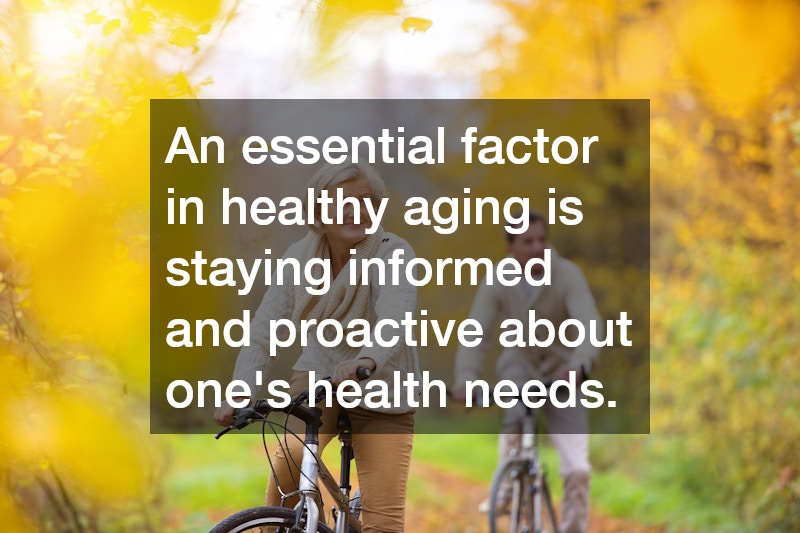
Disclaimer: This website provides health information for educational purposes only and is not a substitute for professional medical advice, diagnosis, or treatment. Always seek the guidance of a qualified healthcare provider with any questions you may have.
As people age, embracing a healthy lifestyle becomes increasingly essential for maintaining both physical and mental well-being. The goal is not merely to extend life expectancy, but to increase the number of years spent living without significant illness or disability. Emphasizing beneficial lifestyle changes can enhance our quality of life as we age, promoting both health and happiness.
Healthy aging encompasses various aspects, including nutrition, physical activity, mental health, and social connections. Each of these components plays a critical role in reducing the risk of chronic diseases, enhancing cognitive function, and improving overall well-being.
As we journey through the aging process, making conscious choices about our daily routines can have a lasting impact on our health.
An essential factor in healthy aging is staying informed and proactive about one’s health needs. This involves regular medical check-ups, staying up to date with vaccinations, and being responsive to health changes. In doing so, we can detect potential health issues early, allowing for timely interventions that can significantly affect long-term health outcomes.
Embracing Regular Physical Activity
Incorporating regular physical activity into daily routines is a cornerstone of healthy aging. Studies have shown that consistent exercise can significantly improve physical strength, flexibility, and balance, reducing the risk of falls and associated injuries in seniors. Personal training studios offer specialized programs tailored to the needs of older adults, focusing on safe and effective exercises that cater to individual capabilities.
Physical activity is not limited to intense workouts; even moderate activities such as walking, swimming, or yoga can yield substantial benefits. The key is consistency and choosing activities that are enjoyable and sustainable in the long term. Many seniors find that engaging in group classes or joining pesonal training studios provides motivation and fosters a sense of community.
Moreover, exercise plays a crucial role in maintaining cognitive health. Regular physical activity helps boost blood flow to the brain, supports neuroplasticity, and can even delay the onset of cognitive decline. For this reason, incorporating exercise into daily life doesn’t just help maintain bodily health but is also a strategic move for preserving mental acuity as we age.
Prioritizing a Balanced and Nutritious Diet
A balanced and nutritious diet is another vital element of healthy aging. The body’s nutritional needs change as we age, often requiring a higher intake of certain nutrients such as calcium, vitamin D, and fiber. Incorporating a variety of fruits, vegetables, lean proteins, and whole grains into daily meals can help meet these nutritional requirements while supporting overall health.
It’s also important to stay hydrated, as older adults are more susceptible to dehydration, which can exacerbate health issues and reduce energy levels. Limiting processed foods and reducing sugar and salt intake can help mitigate the risk of developing conditions such as heart disease and diabetes. Consulting with a nutritionist can provide personalized guidance to develop a diet plan that meets individual health needs and goals.
Adopting mindfulness techniques such as mindful eating can further enhance dietary habits. Mindful eating encourages paying attention to hunger cues and savoring each bite, which can prevent overeating and promote better digestion. This approach not only cultivates a healthier relationship with food but also contributes to overall well-being and longevity.
Maintaining Social Connections and Mental Health
Social connections and mental health are integral components of healthy aging, contributing significantly to emotional and psychological well-being. Engaging with family, friends, and community groups can provide support, joy, and a sense of belonging. Participating in social activities, such as volunteer work or group hobbies, helps maintain cognitive function and fend off mental health issues such as depression and anxiety.
Personal training studios can play a role in enhancing social connections, as they often foster a community atmosphere. Working out with peers or joining group classes can create opportunities for social interaction and relationship building. Such environments provide not only physical benefits but also the emotional support that is crucial as we navigate life’s later years.
Additionally, mental health practices such as meditation, mindfulness, and journaling can help manage stress and encourage positive thinking. These practices, along with regular mental exercises like puzzles and games, contribute to cognitive resilience. Ensuring mental well-being is as essential as physical health in maintaining overall vitality and quality of life during the aging process.
Healthy aging is a multifaceted endeavor that involves making informed choices about our physical, nutritional, and social lifestyles. By engaging in regular physical activity, prioritizing a balanced diet, and nurturing social relationships, we can significantly enhance our health as we age. Personal training studios, with their tailored programs and communal support, offer a beneficial resource in this journey towards aging healthily.
.
